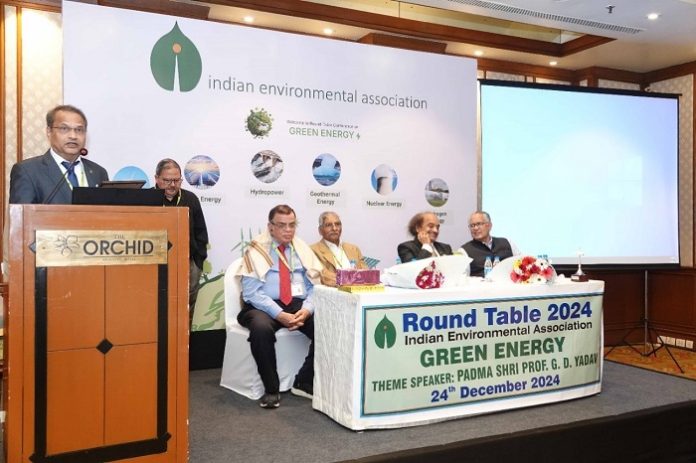The Indian Environment Association organized a roundtable conference on green energy, focusing on challenges, innovations, and opportunities in transitioning to sustainable energy.
The invitation-only event featured prominent academics, researchers, and policymakers, who shared insights on the pivotal role of green energy in shaping India’s future.
Opening Address: Global Energy Concerns
Prof. Dr. G.D. Yadav, Chairman of the Advisory Committee at the ministry of new and renewable energy, delivered the theme lecture on the global energy scenario.
He highlighted the rising global CO₂ levels, which increased from 422.02 ppm in December 2023 to 425 ppm in December 2024, underscoring the urgent need for mitigation strategies.
Dr. Yadav emphasized hydrogen’s potential as a green fuel, noting its specific energy, which is 2.5 times that of ethanol.
However, he acknowledged challenges such as high electrolysis costs ($4–$7 per kg for green hydrogen) and infrastructure limitations related to storage and transportation.
Renewable Energy Achievements and Challenges
Dr. Atul Vaidya, Director of CSIR-NEERI, spoke on India’s progress and challenges in renewable energy.
He lauded India for achieving 100 GW of solar capacity by 2022 under the National Solar Mission and attaining 175 GW of renewable energy capacity, particularly in solar and wind energy.
He addressed misconceptions about renewable energy costs, intermittency, and storage, asserting that advancements in technology and hybrid systems are overcoming these barriers.
Dr. Vaidya recommended strengthening R&D in energy storage, fostering public perception shifts, and enhancing grid integration.
Financing Green Energy Deployment
Dr. Mahesh Patankar, Founder and Managing Director of MP Ensystems Advisory Pvt. Ltd., stressed the importance of financing renewable energy initiatives.
He advocated for rationalizing tariffs for photovoltaic (PV) units and implementing low-cost financing options through government schemes like KUSUM and Panchamrut.
Dr. Patankar also suggested integrating solar solutions with agriculture to boost energy efficiency.
Localized Solutions for Urban Energy Demands
Dr. Ajit Salvi, former Deputy Chief Engineer of MCGM and Director at RCUES, AIILSG, highlighted energy-intensive operations in urban centers.
He proposed localized solutions such as energy-efficient pumping systems for water and wastewater operations in cities like Mumbai and customized sewage management systems to reduce costs and address local conditions.
Resource Constraints and Geopolitical Challenges
Dr. Raghvendra Tewari, Director of the Materials Science Division at Bhabha Atomic Research Centre, analyzed the impact of geopolitical and resource constraints on India’s energy future.
He pointed out India’s heavy reliance on imported lithium and rare earth elements and proposed scalable, low-carbon energy solutions.
Dr. Tewari also emphasized leveraging India’s marine ecosystems as natural carbon sinks to combat climate change.
Key Recommendations and Call to Action
The conference concluded with a call for collaborative efforts to advance green energy initiatives. Key recommendations included:
*Investment in R&D: Focus on hydrogen technology, energy storage, and localized solutions for urban and rural areas.
*Scaling Renewable Energy: Strengthen financial and regulatory support to meet ambitious renewable energy targets.
*Self-Reliance in Resources: Enhance domestic capabilities for processing lithium and rare earth elements.
The conference underscored the urgent need for policy frameworks, coordinated efforts, and innovative financing mechanisms to drive India’s transition to sustainable energy.
During the Round Table. D. P. Misra was presented with IEA Life Time Achievement award for his meritorious services in the field of chemical engineering and for environmental preservation.

































